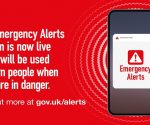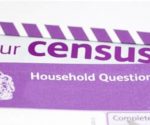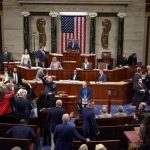The TV Licensing Company – a shake down operation
Imagine that a private company that you had no prior dealings with contacted you demanding money – and not even for any service that they accused you of having been provided with. It sounds a bit like an encounter with a debt collection agency, does it not? – a company with whom you have no contract, but one that assumes your business from its own separate dealings with other parties. Well, such companies can take a hike – and do seem to understand that they are relying on your consent (any “punishment” manifests itself through a national credit ratings scheme – and people really should refrain from empowering these corporate-government gangsterist systems as a matter of patriotism; i.e. stop giving the likes of Experian any money). But what we’re actually talking about is the TV Licensing Company – who are way worse than any debt collection agency, because at least debt collection agencies claim service provision – which can fool a victim into engagement. Partaking in a service represents contract – and this is ultimately why you ignore companies that you have no business with. The TV Licensing Company doesn’t even claim to provide a service – it just wants money.
One might compare the TV Licensing Company to an organisation who writes to you after the purchase of a washing machine, acting on behalf of a manufacturer who makes “Soapysuds” and demanding that because you might use that particular brand of washing detergent, then you must pay monies to them. If you actually use any other soap, then to escape being liable for payment you would have to prove that you don’t use Soapysuds. But actually, this is not a good comparison with the dynamic between TV owners and the TV Licensing Company. A better one is a Saucepan Licensing Company acting on behalf of a water supplier that contacts you to ask that you prove that you are using your saucepans to boil milk rather than tap water. We can all see the ludicrousness of the situation, and we can all agree that we wouldn’t tolerate the attempt to insert business where there is none. And yet in fact, even this comparison is no good (water companies can control who they supply to).
The BBC, who the TV Licensing primarily acts for, broadcasts its product indiscriminately. In common law, if you receive unsolicited, then you don’t have to pay. So to begin with, there is no contract between the BBC and any TV owner, whereas there is one between the makers of Soapysuds and the washing machine owner – the latter has bought the product on the understanding that it does what it claims it can do; this is contract. If the TV Licensing Company claimed to own the means by which you received TV broadcasts (or was acting on behalf of another party making that claim), then things might be different. But the TV Licensing Company demands payment even though (and because) you are able to receive unsolicited – self-evidently in contrariness to your common law rights. In a well-adjusted and free country, all TV companies would have to advertise on what is obviously a free network, or would charge a subscription so that there was contract. However, no one in the British Government wants a well-adjusted country. They want to propagandise you, and they want you to pay for it.
Well, they don’t get what they want any more.
Having established that, in the first instance, the TV Licensing Company functions from very flimsy ground in terms of Law, let’s have a look at the criminality of their money collecting operation. All one needs to do is examine the letters that are sent out to people who won’t pay the TV Tax. The author has a collection from October 2016 – this is when he decided to stop throwing them away and retain them for evidence of “attempted extortion of monies by threats”.
October 2016. The title of this letter is “Official Warning: we have started an investigation”. Then it goes on:
To the Legal Occupier,
This is an official warning that we are carrying out an investigation of your address. We have asked you to contact us several times, but you have not responded. There is still no record of a TV Licence at this property.
It then goes on to explain the “law”, and then how to stop the investigation: options telling you that you can pay for a Licence, transfer a Licence if you have just moved, or by letting them know that you don’t use TV receiving equipment; “we may confirm this with a quick visit”, it states.
The first thing that we should notice is the failure to make a clear distinction between owning and using TV receiving equipment, and what either means in terms of being exempt, or not, from paying the TV tax. It has to be said that further detail is provided on the reverse of the letter, but again there is no overt information regarding how ownership of TV receiving equipment is perfectly legal without being any business of TV Licensing. Again, it is couched in an apparent requirement to inform TV Licensing: “let us know if you never watch or record programmes as they’re being shown on TV”.
Now, if you still use TV to receive live television broadcasts – shame on you. Imagine, if you can, that you own a TV, but don’t use it to become propagandised by the State. If you receive abovementioned letter, then you have become a potential victim of a confidence trick to prompt you, who have no need whatsoever to engage with a private company that wants to sell you something, to contact that company to invite the selling. Furthermore, through threats of punishment, the letter bullies this contact out of you, and thus also bullies consent to the terms related to claiming exemption.
What are these, exactly? The letter says that if you contact TV Licensing to claim no need for a Licence, then it may visit to verify. So, when you contact them to claim innocence, they assume you have consented to this happening. This has to be the case because a visit is set out as a consequence of your contacting them – and then you agree to it by contacting them. And what does the term “visit” imply? The inspectors aren’t going to stand at your windows peering in through the net curtains. They are going to want to inspect your television set, which means entering your house. And so what will be the outcome of your contacting them? They will have further information and leverage by which to escalate their harassment of you – for the purpose of selling you something that you don’t need. The bottom line is this: they are a private company looking to make the pips squeak – and they’ve been given carte blanche by the government to do it. They aren’t ever going to be happy that you aren’t being squeezed as well.
The next letter dated November 2016: “We visit 10,743 addresses a day. Is yours next?”
As there is no record of a TV Licence at your address, you can expect an Enforcement Visit at any moment. Our officers knock on over 10,000 doors a day. That’s one every 5 seconds. Day. Evening. Even on weekends.
The letter goes on to threaten prosecution arising from the visit of this “Officer”, and bears a seal to make it look like something issued by a court: “Enforcement Officer Visit Approved”. It goes on to detail the punishment that the recipient of the letter might face.
At this juncture we need to remind ourselves that in England it is traditional to presume innocence. In fact, it is a basic right to be viewed as an innocent party at the outset of any investigation into wrongdoing. Indeed, even when someone is made a suspect, the presumption of innocence is maintained. However, what letters from TV Licensing do, and this type especially, is presume guilt. If there is no TV Licence at the address, the assumption is that there is Licence fee evasion; it is indicated in the fact that you are the target of an enforcement.
An enforcement – what is that? This is when a power that is lawfully in the right acts to stop behaviour that is unlawful. However, does that really apply with regards the way TV Licensing brandishes the word “enforcement” at someone who has TV receiving equipment but does not receive TV? No, it does not. When victimising an innocent, the TV Licensing Company is pretending to be an authority acting in the right, when it can’t be in the right because it is not stopping unlawful behaviour – because there is none. Therefore, it cannot be an authority – because it is not acting lawfully. By presenting itself as such to innocent people, it is acting fraudulently – and in threatening punishment and intimidation (with personal visits and searches) it is compounding its criminality. And for what purpose is this fraud? To extort monies, of course. So,what enforcement means here is acting to make innocent people believe that they are breaking the law, and make them believe that in order to rectify the situation they have to make payments of monies. This is what is known as a “shake down”. Shake downs are, for instance, what corrupt police do when they stop vehicles and threaten to charge the driver with a misdemeanour – unless the victim pays the cop money. Shake downs are what gangsters do when they turn up at an establishment demanding protection money. The TV Licensing Company is a shake down operation. And actually not just in the narrow terms of targetting people who don’t watch TV. As noted before, receiving without asking is essentially being given, and no reimbursement is required. No demand for reimbursement should be forthcoming.
Letters from the TV Licensing Company come every month, and vary very slightly from the ones described above, but there are a few more items of content that need to be discussed. The first is the statement contained in the January 2017 letter from the Licensing Company to the author. It bluffs like this: “You have until 2nd February to get correctly license… if you think you don’t need a licence, you should tell us in the next 10 days”.
Notice how the recipient of the letter is told that if they have cause to dispute the Licensing Company’s assertion and demand, then it’s because he or she only thinks it – i.e. they are potentially mistaken. This time, the invitation to contact is presented in terms of an order to do it. This is confidence trickery, no more, no less. But one should not expect anything else from gangsters.
The follow up letter, February 2017, comes with regret, apparently. Because there was no response within 10 days of the last letter there is “no option” but to start an investigation of the address in question. This letter, for the first time, starts to mention a court process:
If they [the Enforcement Officer] find evidence that you are watching… they will interview you under caution and this could be used as evidence in court.
Be clear, what this letter is doing is blurring the boundaries of fact one into the other, because it also states in a separate sentence that a warrant can be issued by a court to gain access to conduct a search (a very rare thing, all good sources report). However, the above quote is from a part of the letter that is about a routine visit by an “Enforcement Officer” – with the assumption that the victim has acquiesced and allowed entry. Obviously, the TV Licensing Company wants to give the impression that a warrant will be flourished with routine visits (because the interview is apparently only conducted when a warrant is produced – see below). Enforcement Officers on routine visits can be told where to go with no repercussions, and have the door slammed in their faces (indeed, they might be deemed to be trespassing, and of course householders have certain rights in that respect). There is a school of thought that householders should be polite so as to encourage further visits and have the Licensing Company waste money. However, we should be interested in the morale of “Enforcement Officers” and how eager or reluctant they are to do the TV Licensing Company’s dirty work.
The general information out there on the internet (where you have to find it, because the official documents that explain expected conduct and process during a search with a warrant are redacted so that the public can’t read them and know what to expect – well, we are dealing with gangsters) suggests that an interview under caution occurs with a visit from an Enforcement Officer with a warrant. A victim is expected to give reasonable assistance so that any TVs can be checked, but does not have to allow himself to be interviewed – “no comment” to all and any questions should be perfectly acceptable (as should writing “declined to be interviewed” when signing any paperwork). Be that as it may, the easiest thing to do must be not answering the door. The Licensing Company have made public reassurances that it doesn’t break in to conduct a search with a warrant – so why not leave them standing on the doorstep?
And yet it’s not enough just to have defensive strategies against gangsters. There needs to be attack. The TV Licensing Company needs to be taken down. It’s well past time to take the TV Licensing Company down. We do it by insisting that it is engaging in criminal activity that its victims need protection from, and that if the “law” is, to the contrary, facilitating what is essentially a shake down operation, then it is a disgrace, and in fact no law at all. We create a fashion whereby the TV Licensing Company is perceived as being a criminal outfit. There may well be legal courses to take through which to attack the enforcement of the TV tax – please contact the author with any ideas – and the approach shouldn’t be ruled out even though we may think that the British legal system is going to be stacked against doling out justice in respects of the means by which the State funds its propaganda. What is primarily needed is a general understanding in the mass ranks of the public of the actual criminality of TV tax enforcement – and it goes without saying that this needs to be accompanied with an appreciation of TV programming as a social control mechanism, with terrible consequences for individual human development.


















